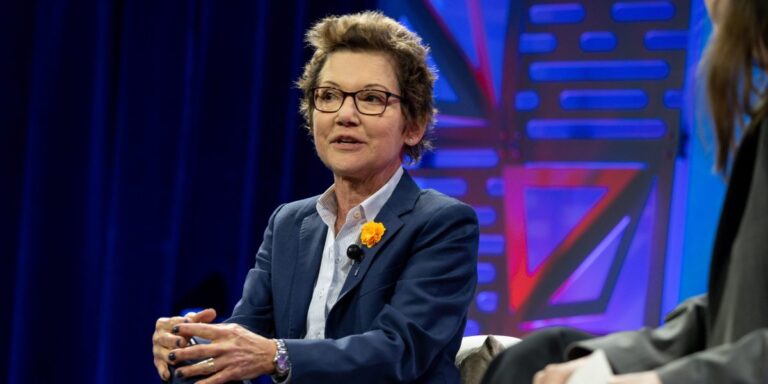
The CEO of the Federal Reserve Bank of San Francisco offered an optimistic view of artificial intelligence’s impact on jobs, noting that while companies are still figuring out how to best leverage the technology, she’s seen early signs that AI is helping workers more than it’s hurting them.
Mary Daly, who oversees a Federal Reserve region that includes Silicon Valley among its nine Western states, gave her take on the state of the job market Monday at the Fortune Brainstorm Tech conference but declined to give an indication of when the next rate cut might come.
In a wide-ranging interview onstage in Deer Valley, Utah, Daly said the tech sector is still growing “because it brings us all kinds of new things. It helps us do better business, it helps us improve our way of life, and it helps us make the world a better place.”
The U.S. labor market, which has been tight since 2021, is softening, Daly said. The U.S. unemployment rate hit 4.1% in June, a two-and-a-half-year high, according to the Bureau of Labor StatisticsCompanies are looking for ways to meet demand and do things faster. She spoke about Honeywell which was suffering from a labor shortage and was using AI to augment its workforce rather than replace its workers.
“They were replacing tasks, not people, and people were being diverted to other things,” Daly told an audience of venture capitalists and tech entrepreneurs.
“No technology in the history of all technology has reduced employment, at least not in total,” she added.
The Federal Reserve was also expected to cut interest rates at least once this year, but it has yet to do so. Inflation has remained stubborn, making the Fed reluctant to cut rates, according to CBS NewsDaly said she expected “policy adjustments over the next few quarters,” but gave no indication of how many rate cuts might come or when.
Daly was also asked about the impact rate cuts could have on the valuations of booming technology companies like Nvidia. The chip company currently has a market cap of $3.16 trillion. Tech company valuations move in ways that aren’t always tied to the economy, she said. “It’s not clear how a change in interest rates will affect valuations,” Daly said.
Asked about Donald Trump’s expected return to the White House, Daly was also circumspect. The Fed is mandated by Congress to remain independent even if it faces a hostile presidential administration, she said. The Fed’s most important asset is its integrity, while its most important tool is the trust of the people, she said. “The American people are our shareholders. We have to earn their trust and respect by doing a great job,” she said.


